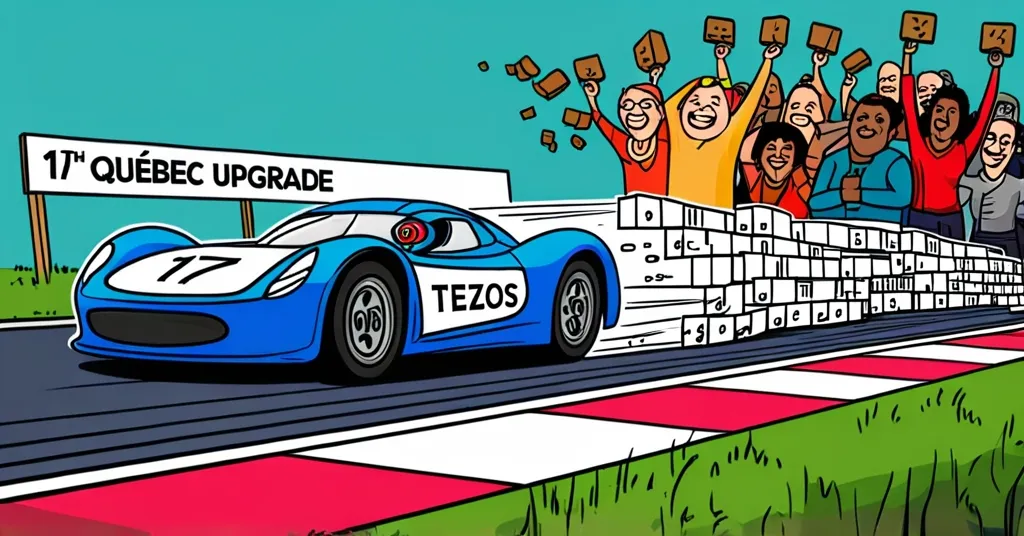Tezos Quebec Upgrade: Faster Transactions, Enhanced Staking, and Decentralized Governance

Tezos Revs Up with Quebec Upgrade: Faster, More Efficient Blockchain
Tezos has turbocharged its network with the Quebec upgrade, its 17th protocol enhancement, aimed at improving speed and efficiency. This latest update reduces block times, refines staking, and enhances governance, positioning Tezos as a frontrunner in blockchain technology.
- 17th protocol upgrade named Quebec
- Block time reduced from 10 to 8 seconds
- Staking system updated, with bakers accepting more external stakes
- On-chain governance system used for approval
What is the Quebec Upgrade?
The Quebec upgrade, developed by Nomadic Labs, Trilitech, and Functori, marks another milestone in Tezos’ continuous evolution. At its core, the upgrade slashes block times from 10 to 8 seconds, speeding up transaction finality—the point at which a transaction is considered complete and irreversible on the blockchain—to just 16 seconds. This leap forward is crucial for applications that thrive on quick processing, like payments and gaming. Imagine a world where you can settle your bets in a blockchain-based poker game faster than you can say “all in.”
But it’s not just about speed. The Quebec upgrade also refines the network’s sustainability and functionality. “Bakers,” Tezos’ term for validators, are now empowered to accept external stakes up to 9 times their own, up from the previous limit of 5. This shift not only makes staking more attractive but also strengthens network security.
Impact on Staking
The staking mechanics have undergone a significant overhaul with the Quebec upgrade. Bakers can now take on more external stakes, potentially increasing their rewards. The Adaptive Issuance mechanism, which adjusts the issuance of new tokens based on network activity, has also been fine-tuned. Active stakers can now earn 3 times the yield of delegators, up from 2 times, making the staking game even more rewarding without breaking the bank.
What’s particularly noteworthy is Tezos’ commitment to keeping hardware requirements low for bakers. This approach ensures that the network remains decentralized and accessible, a stark contrast to other blockchains that demand ever-increasing computational power. In the world of crypto, where decentralization is king, Tezos keeps it real by keeping it simple.
Governance and Community Involvement
Tezos’ on-chain governance system, which allows the community to vote on and approve upgrades, played a pivotal role in greenlighting the Quebec upgrade. This democratic process underscores Tezos’ dedication to community-driven development, proving that in the crypto space, democracy isn’t just a buzzword—it’s a way of life.
Unlike other blockchains that often rely on disruptive hard forks to implement changes, Tezos’ self-amending protocol allows for seamless upgrades, keeping the community united and the network strong. This approach not only fosters a sense of ownership among users but also sets a benchmark for how blockchain projects can evolve without fracturing their communities.
Use Cases and Applications
The Quebec upgrade’s faster transaction speeds open up a plethora of use cases. Beyond the obvious benefits for payments and gaming, where every second counts, other sectors like DeFi could also reap rewards. Imagine DeFi platforms where transactions are processed in a snap, enhancing user experience and potentially attracting more users to the ecosystem.
Historically, Tezos has been pushing the envelope with its upgrades. The Quebec upgrade continues this trend, building on previous enhancements to make the network more robust and versatile. It’s not just about keeping up with the Joneses in the blockchain world; it’s about setting the pace.
Potential Challenges and Criticisms
While the Quebec upgrade brings significant improvements, it’s not without potential challenges. Critics might argue that the increased staking limits could lead to centralization, as larger bakers could dominate the network. It’s a valid concern, but Tezos’ commitment to low hardware requirements helps mitigate this risk by keeping the barriers to entry low.
From a Bitcoin maximalist perspective, any altcoin upgrade might be met with skepticism. However, even the staunchest Bitcoin advocates must acknowledge the importance of innovation in the broader crypto ecosystem. Tezos’ upgrades align with the principles of effective accelerationism, driving technological progress and pushing the boundaries of what’s possible with blockchain technology.
Moreover, the Quebec upgrade enhances user privacy and financial freedom, core tenets of decentralization. By making the network faster and more efficient, Tezos empowers users to transact with greater autonomy and less friction, aligning with the ethos of disrupting the status quo.
Future Implications
The Quebec upgrade cements Tezos’ position as a leader in blockchain technology. By continuously improving its network, Tezos not only stays ahead of the curve but also sets new standards for what blockchains can achieve. The future looks bright for Tezos, with its commitment to speed, efficiency, and decentralization paving the way for a more inclusive and dynamic blockchain ecosystem.
Key Questions and Takeaways
What enhancements does the Quebec upgrade bring to Tezos?
The Quebec upgrade introduces faster transaction speeds by reducing block times from 10 to 8 seconds, improves staking by allowing bakers to accept higher external stakes, and refines the Adaptive Issuance mechanism to better balance staking rewards with inflation control.
How does the Quebec upgrade impact Tezos’ staking system?
The upgrade increases the external stake limit from five to nine times a baker’s own stake, making staking more attractive and strengthening network security. It also adjusts the reward system, allowing active stakers to earn three times the yield of delegators, up from two times.
What is the significance of maintaining low hardware requirements for validators?
Maintaining low hardware requirements ensures that participation in the Tezos network remains accessible to a wide range of validators, or “bakers,” thereby promoting decentralization and network health.
How does on-chain governance play a role in Tezos’ upgrades?
Tezos’ on-chain governance system allows the community to vote on and approve upgrades, such as the Quebec upgrade, ensuring that changes are implemented in a democratic and decentralized manner.
What applications could benefit from Tezos’ improved transaction speeds?
Applications requiring quick transaction finality, such as payments and gaming, could benefit significantly from Tezos’ improved transaction speeds due to the reduced block time.



